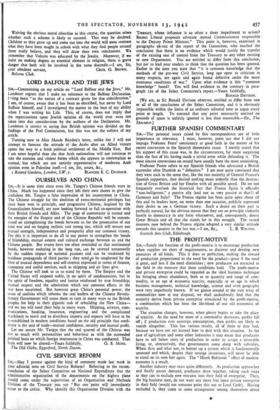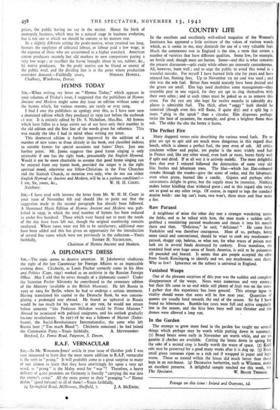THE PROFIT-MOTIVE SIR,—Surely the function of the profit-motive is to
encourage production when supplies are short of requirements, to discover and develop new resources of all kinds. This it does to perfection, making the reward of production proportional to the need for the product—great if the need is great, and less if the need diminishes ; new producers are attracted to the field in the measure that these conditions hold. The profit-motive and private enterprise could be regarded as the ideal business technique for bringing about abundance, both as to quantity and range of com- modity, in an age of economic scarcity, especially in an age in which business management, technical knowledge, science and even geography were very imperfectly known. If we glance around at the vast array of commodities now at our disposal, we shall undoubtedly find that the majority derive from private enterprise stimulated by the profit-motive, a combination which has been the life-blood of our old economics of scarcity.
The situation changes, however, when plenty begins to take the place of scarcity. As the need for more of a commodity decreases, profits fall off ; if production ever outstrips consumption, then profits are likely to vanish altogether. This has various results, all of them to date bad, because we have not yet learned how to deal with this situation. In the case of agriculture and some other industries it may mean that producers have to sell below costs of production in order to scrape a miserable living, or, alternatively, that governments come along with subsidies, Wheat Acts and what not, to bolster up a system which is fundamentally unsound and which, despite their strange inventions, will never be able to stand on its own feet again. The " Heath Robinson " effect of modern economy is a result.
Another industry may react quite differently. As production approaches and finally passes demand, producers draw together, taking such steps as they can to exclude new entrants into their field of enterprise. They, the big business men, do not want any more free lance private enterprise in their field (would not someone point this out to Lord Croft). Having excluded it, they come to some arrangement among themselves about prices, the public having no say in the matter. Hence the birth of monopoly, business, which may be a natural stage in business evolution, but is not one at which we should be content to let matters rest.
In a slightly different setting the profit-motive, when retained too long, favours the employer of coloured labour, or labour paid a low wage, at the expense of those who are accustomed to a higher standard. American cotton producers recently lost old markets to new competitors paying a very low wage ; or recollect the havoc brought about in tea, rubber, &c., by native producers. So the profit motive can be friend or enemy of the public weal, and the dividing line is at the point where production overtakes demand.—Faithfully yours, NORMAN HOWELL. Chalbury, Wimborne, Dorset.



























 Previous page
Previous page